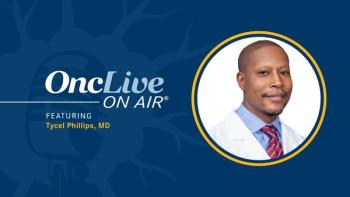
Addressing Unmet Needs in Salvage Therapy for FL
Transcript:
Bruce Cheson, MD: Patients with follicular lymphoma in the relapsed/refractory setting do present an unmet need. There are only a couple of drugs that are approved by the FDA. There’s idelalisib. There’s Y-90-ibritumomab tiuxetan, or Zevalin. Perhaps R2, rituximab/lenalidomide, will get approved. But other than that, there’s really nothing, particularly for patients who have had an early progression—those who progress within a year or 2. There is nothing really exciting that is specific for those patients, and that’s why clinical trials need to focus on that population. So, we need clinical trials to help us develop new drugs for patients who have relapsed.
Another group that represents an unmet need are patients who are rituximab-refractory. Looking at that group of patients, we conducted the GADOLIN trial. This was an international phase III randomized comparison in patients who were rituximab-refractory, as defined as less than a PR to their prior regimen or progressing within 6 months of a prior rituximab-based program. The schema was as follows: one arm was treated with bendamustine alone, 120 mg/m2 on days 1 and 2, which is the approved dose and schedule, or bendamustine at 90 mg/m2 on days 1 and 2 plus obinutuzumab at a 1000-mg flat dose, followed by obinutuzumab maintenance out to 2 years.
And there were several very important and fascinating observations in this study. The response rates were exactly the same. Complete and overall response rates at the end of the therapy, and at the 12-month mark, were the same in the B (bendamustine) and the B/O (bendamustine/obinutuzumab) group—the company calls it B/G. But the progression-free survival was significantly longer with obinutuzumab, with a hazard ratio around 0.57. Importantly, the overall survival was significantly longer with a hazard ratio, a reduction in death, of around a third. How can this be if the response rates were the same?
Well, we looked at assays of minimal residual disease, and what we found was—mid-induction, end of induction—the likelihood of being MRD-negative was significantly greater with the combination arm than the single agent. And it occurred fairly rapidly. Through the maintenance phase, more patients remained MRD-negative in the combination arm with maintenance than in the single-agent arm. And if you look at patients who became MRD-negative with the doublet, their outcome was significantly better than the other 3 possibilities, even the combination arm who were MRD-positive or the bendamustine alone arm who were MRD-negative.
So, it is a package. You’ve got benefit in induction and you’ve got benefit during the maintenance phase, and this is probably the first study to show a survival benefit for maintenance in follicular lymphoma. It’s a very important study that has improved the outcome for rituximab-refractory patients. But we still have a long way to go, and we still need to develop newer and more effective drugs for these patients.
Transcript Edited for Clarity


































